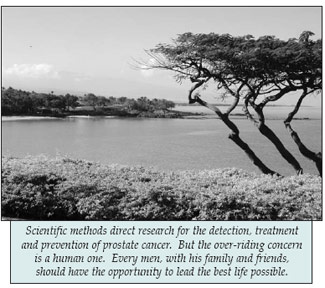URF and Dr. Catalona’s Prostate Cancer Research Collaborations Help Other Scientists
Researchers build upon each other’s findings
 The possibility that some prostate cancers might be caused by a virus has received media attention in the last few months.
The possibility that some prostate cancers might be caused by a virus has received media attention in the last few months.
If research shows that a virus causes some prostate cancers, then developing new drug therapies, and, perhaps a vaccine, to treat or prevent prostate cancers is a possibility.
The report receiving the latest publicity came from a team of scientists in Cleveland and San Francisco who said that they discovered a new virus (XMRV) among patients with familial prostate cancer, which accounts for about nine percent of all prostate cancers.
The search for this virus in prostate cancer patients came about with the discovery of a gene mutation (RNAseL, variant 462Q), which appears to make patients susceptible to viral infection.
These most recent discoveries on the virus XMRV are connected to this earlier research (Casey G, Neville PJ, Plummer SJ, Xiang Y, Krumroy LM, Klein EA, Catalona WJ, Nupponen N, Carp ten JD, Trent JM, Silverman RH, Witte JS. in Nature Genetics 2003, April) on the gene, RNAseL.
RNAseL appears to help fight viruses in all people, but men with this gene mutation also seem to be at greater risk for prostate cancer.
Because the gene is connected to fighting viruses, researchers thought that a virus could be involved in some prostate cancer, and they began to look for it.
Now, it appears they might have found it, at least in men with familial prostate cancer.
Further studies will be conducted. In addition, researchers will look into the relationship between the virus and a patient’s sexual activity and personal and family medical history.
Researchers build upon each other’s findings. Dr. Catalona and the Urological Research Foundation are participating in collaborative efforts across the United States and around the world.











